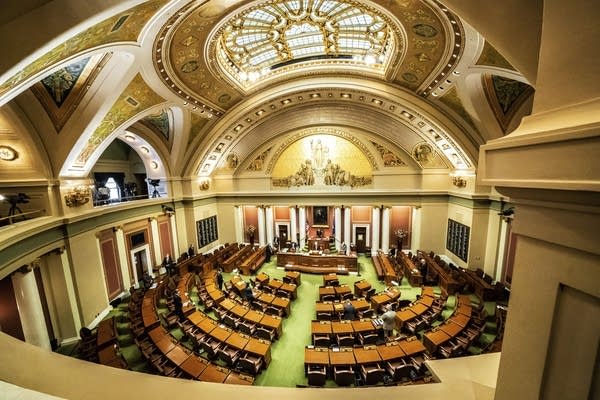Special session enters second week with little accomplished
Bonding bill, police reform, mask mandate still under discussion

Go Deeper.
Create an account or log in to save stories.
Like this?
Thanks for liking this story! We have added it to a list of your favorite stories.
The second special session of summer is entering its second week — and it hasn’t been very eventful so far. No major bills have received votes, although one is on the docket for action Monday. But even that one, a massive construction projects bill, is in doubt.
Capitol watchers say it’s helpful to remember why lawmakers are back at the Capitol in the first place. When Gov. Tim Walz renewed his executive powers to battle COVID-19 he was forced to call a special session so the Legislature could decide if that authority would stand.
Republicans in the Senate voted to undo the executive order, but the Democratic-led House didn’t go along.
The Legislature has been working to reach agreements on other outstanding matters, but so far hasn’t quite gotten there.
Turn Up Your Support
MPR News helps you turn down the noise and build shared understanding. Turn up your support for this public resource and keep trusted journalism accessible to all.
First up this week is a huge construction bill that would give the go-ahead to more than $1.8 billion worth of projects all around Minnesota.
It includes millions for state park and trail improvements, from the new park on Lake Vermillion to the riverfront trail down in Winona. There’s money to fix problems at landfills, patch roofs on college campuses, spruce up the Minnesota Zoo and replace a state emergency operations center.
It’s called the bonding bill because the state would sell bonds to pay for the work. In this case, it’s mostly general obligation bonds — about $1.35 billion. That’s important because to issue that kind of debt, the constitution requires the bill to pass with three-fifths majorities in both chambers.
That makes it the only bill that requires bipartisan votes in both chambers given the current layout. And there is a real question as to whether that will happen.
Republicans in the House say they won’t put up the six votes it would take to put the bill over the top, assuming all DFLers are a yes.
One reason is that the GOP caucus wants to use it as leverage to unwind some of the Walz coronavirus executive orders. If the governor backs off those, House Republican leader Kurt Daudt says that changes things.
Walz and Democrats are upset the two issues are connected. They’re playing some hardball of their own, taking the unusual step of attaching a tax bill — with some business and income tax breaks Republicans want — to the bonding bill. That $100 million in tax relief could make it harder for some Republicans to oppose.
The bonding bill must pass the House first.
Also under discussion are proposals to help rebuild businesses damaged in the unrest following the killing of George Floyd.
During the first special session last month, the House passed what it has called the “Promise Act.” It didn’t get a Senate vote.
Talks have continued since and there could be another attempt this week to push something forward. One bill to filter about $170 million through affected cities for a relief program awaits a vote.
Rep. Barb Haley of Red Wing says Republicans support the rebuilding goal but aren’t on board with having state taxpayers pick up the tab, especially given Minnesota’s budget problems.
“General fund revenue, which we don’t have, we’re facing a deficit. So we need to find some other revenue source in order for this to move forward,” Haley said.
Democrats say they’ve consistently supported recovery measures for cities around the state hit with disasters, whether that’s a major employer leaving or a flood.
Minneapolis Rep. Hodan Hassan says many of the affected area’s business owners can’t afford to rebuild without government help. And she worries about hollowed out neighborhoods or gentrification without them.
“People who are on Lake Street cannot move. The business owners cannot move and open a business in Edina or Lakeville or Minnetonka,” she said. “The communities they serve are in south Minneapolis. They cannot just up and take the insurance money and open a store somewhere else and still serve the communities they are serving.”
Discussions have continued about police reform at the Capitol, but mainly behind closed doors. Walz convened a listening session on Friday for Senate Majority Leader Paul Gazelka with families of people who have lost relatives in police encounters. There’s been little said about what transpired.
Walz said Friday morning that he’s hopeful of getting something done. What shape that takes remains to be seen.
He is also expected to make a decision this week on whether to issue a statewide mask mandate.
The governor has said he is trying to generate buy-in. He says people who want more services and businesses open fully should get on board because mask-wearing would keep the coronavirus in check.
But Walz says he’s prepared to move on a requirement that people wear masks in public if he thinks the virus is spreading too fast. Republican governors in the South have done so as their cases spiked.


